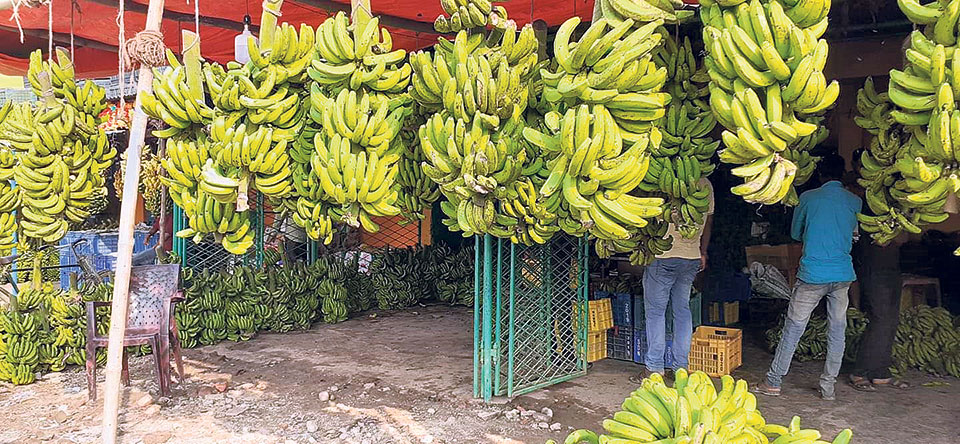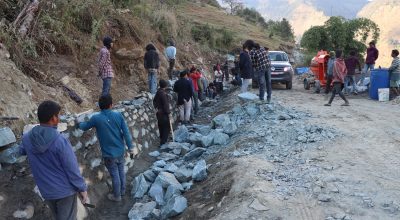
Birtamod, Nov 15: The commercial banana-farming started by five youth of Jhapa district a year ago with an investment of Rs 5 crore, with the idea that it is better to sweat at home than to go abroad, has now started yielding promising results.
Basudev Upreti, Kamal Thapa, Prem Khadka, Prakash Niraula and Daroga Jaiswal have taken up 20 bighas of land in Bhadrapur Municipality-5 and 57 bigha in Gauradaha-5 of Jhapa district. They also established a company named Shree Ganapati Agriculture Pvt Ltd.
Company Chairman Basudev Upreti informed that the production from the Bhadrapur banana farm has already reached the market on the occasion of this year’s Dashain and Tihar festival, while the Gauradaha farm is ready for market. According to him, 28,000 ghari of fruit have been sold from Bhadrapur farm this time. They sent banana to the markets of Kathmandu, Birgunj, Chitwan and Pokhara. The company itself sold all the bananas for an average of Rs 1,200 per ghari.
Chairman Upreti informed that bananas worth Rs. 3.36 crore was sold from Bhadrapur farm alone. “In the first year of production, Bhadrapur farm became profitable”, says Upreti, “There is a hope of getting more profit next year. The company had to face different problem this season. We have plans to get more benefits in the coming years.”
The company leased a land of old Bhadrapur Gaushala under an agreement to pay an annual rent of Rs. 5 lakh, while the private land of many people in Gauradaha was taken by the company on the condition of paying a lump sum annual rent of Rs 10 lakh. According to Upreti, 30,000 banana plants have been grown in the Bhadrapur farm and 80,000 in Gauradaha. Banana plants of an advanced variety called ‘G Nine’ have been grown in the nursery using tissue culture techniques. He said that each plant was purchased at Rs 35.
In Birgunj, Khudunabari and Gauriganj, there are nurseries for raising banana plants. A plant grown once will continue to produce new plants for five years. This advanced variety bear fruit in nine months, and ready in 12 months.
Kamal Thapa, another owner, says that since there are large ghari, it gets market easily. Jaiswal is an experienced trader of Birtamod’s agricultural wholesale market for 40 years among the youths.
Despite the large investment, Shree Ganapati Agriculture Pvt. Ltd. has not been able to get government subsidies and incentives so far. “With the lack of cold storage facilities, we have to bear loss as well,” said Thapa.
Prakash Niraula, another partner, says that it takes three days to deliver banana to the market in Kathmandu, and transport costs up to Rs 50,000 per vehicle. He expects government’s help to subsidize on establishing cold storage facilities and transport vehicles with cost participation.
Farmers have repeatedly raised voice that bananas coming in from the Indian market at cheap prices pose a big challenge to the domestic products. They say that if the import of Indian bananas is stopped, the local produce will get a market. Manager Niraula says that despite the government’s program to create jobs in the country and encourage agriculture, real farmers are unable to get subsidies for fertilizers, seeds, irrigation, equipment and marketing.
Daroga Jaiswal says that he had to bring agricultural technology from India and apply it to banana farm. He says that if the government will get as much subsidy as needed for pipes and chemical fertilizers for irrigation, Nepali youth will not have to go to Gulf countries in search of employment.
“Governments have been kept on saying high priority on agriculture loudly over the years, we have not got anything here”, he says, “We need agricultural equipment, tractors, vehicles for transportation, pipes for irrigation and other materials.”












